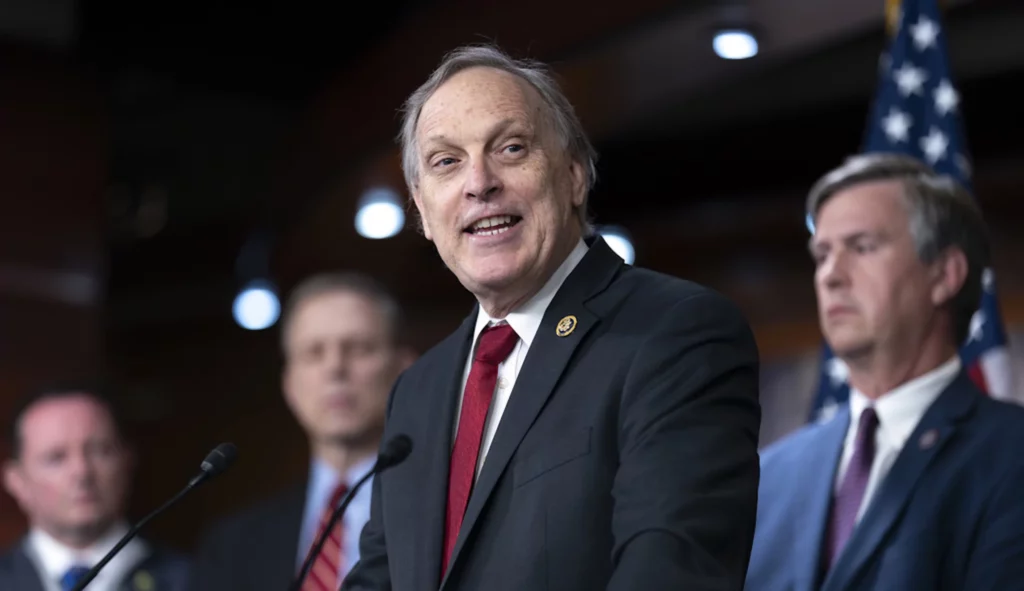
Republicans hope to take a bigger axe to President Joe Biden’s regulatory agenda next year with a bill that grants Congress the power to repeal rules in one large batch.
The House will consider the Midnight Rules Relief Act on Tuesday, legislation that would allow lawmakers to undo the regulations submitted in Biden’s final year in office with a single “joint resolution of disapproval.”
MEET THE NEW CONGRESS: THE HOUSE AND SENATE FRESHMEN ELECTED TO SERVE NEXT YEAR
Currently, Congress can repeal a president’s parting rules with a simple majority in each chamber and the signature of the president. But each must be considered individually under the Congressional Review Act, with a 60-day “lookback” window that limits its reach.
“Congress is inhibited by the statutory scheme that’s there now,” Rep. Andy Biggs (R-AZ), the sponsor of the bill, told the Washington Examiner. “You get a lot of rules that just persist simply because we don’t have the time or the ability to deal with it.”
The legislation is envisioned as a way to give Congress a larger role in rejecting rules when administrations change hands. The CRA not only allows regulations to be overturned with a simple act of Congress, but it does so in a way that is considered permanent.
Future administrations cannot craft rules that are “substantially similar” to the one being overturned.
The Trump administration could reverse any of the same regulations on its own but through an administrative process that takes a year or longer.
“This is about setting up the 119th Congress and the incoming Trump administration for success to execute on the mandate that they were all just given,” said Brittany Madni, the executive vice president of the Economic Policy Innovation Center, a conservative think tank.
This is not the first time Republicans have attempted to expand the Congressional Review Act. The House passed a version of Biggs’ bill twice in anticipation of President-elect Donald Trump taking office in 2017.
However, the legislation died in the Senate each time, lacking the 60 votes needed to overcome a Senate filibuster.
Republicans are confronted with a similar reality as they prepare to once again assume unified control of Washington. They will control 53 Senate seats next year, with narrow House margins posing another obstacle.
Nonetheless, Biggs sees an opportunity to sidestep the filibuster using a legislative procedure known as budget reconciliation. He has begun to discuss with his GOP colleagues the idea of attaching the Midnight Rules Relief Act to one of two reconciliation bills Congress will consider next year.
At the same time, EPIC has been working through the “technical details” of how to get the legislation past the Senate parliamentarian. Any legislation included in a reconciliation package must not run afoul of the Byrd Rule, which requires that all provisions have an impact on the deficit.
“In fact, something like this might be a way to actually add to the revenue, which would pass the Byrd Rule and also pay for a lot of the programs that I know we’re gonna have to pay for,” Biggs said, a former chairman of the conservative Freedom Caucus.

This past Congress, Republicans tried and failed to repeal a bevy of Biden regulations using the CRA. A handful of them got through the Democratic-controlled Senate, including the repeal of Biden rules on water quality and labor rights, but Biden vetoed them when they reached his desk.
Those rules will be beyond the reach of congressional Republicans in January. It is estimated that the “lookback” window will extend to regulations submitted in the late summer.
Still, Republicans see the CRA as a way to counteract a wave of late rulemaking by the Biden administration. In his final months, the president has submitted regulations covering home safety standards, environmental pollutants, and more.
As of now, there are 90 “significant” rules eligible for repeal, according to a review by George Washington University’s Regulatory Studies Center. Of those, 31 have an estimated annual impact of at least $200 million.
“I mean, we’re not talking nickels and dimes here. We’re talking real money,” Biggs said.
The last time Trump entered office, the limiting factor was time on the Senate floor. Each CRA resolution requires up to 10 hours of debate, and Republicans were preoccupied with confirming Trump’s Cabinet nominees.
Congress ultimately undid a record 16 rules at the outset of Trump’s first term, marking the most expansive use of the CRA to date. By comparison, Biden worked with a Democratic Congress to overturn three.
But Republicans would have undone more had there been fewer procedural obstacles. Anthony Campau, a fellow on regulation at EPIC who served on the 2017 transition, told the Washington Examiner he helped identify a list of more than 200 rules for repeal using the CRA.
Jason Schwartz, the legal director at New York University’s Institute for Policy Integrity, believes the CRA’s limits are proper, forcing Congress to deliberate on each regulation it wants to nullify.
“It’s already very broad. I don’t think we need to make it any broader,” he said, noting that conservatives have other avenues of recourse, including the federal courts.
Schwartz believes the legislation should be amended to clarify what constitutes a “substantially similar” regulation. Otherwise, the law will have a chilling effect with the more regulations Congress overturns, he said.
“Agencies might be afraid to ever touch the subject again, even if Congress only had a relatively narrow objection to the very specific form of that particular regulation,” Schwartz said, an adjunct law professor at New York University.
“The Congressional Review Act really is a sledgehammer where sometimes Congress may only need a chisel,” he added.
Republicans hope the tool will be useful as Trump promises a wholesale reevaluation of the federal government. During his campaign, he floated the idea of repealing 10 regulations for every new one, up from the 2-to-1 ratio of his first term.
Trump also created a new fiscal commission, led by Tesla CEO Elon Musk and entrepreneur Vivek Ramaswamy, tasked with proposing a regulatory rollback.
CLICK HERE TO READ MORE FROM THE WASHINGTON EXAMINER
“I mean, he has really increased the intensity here,” Campau said of Trump. “And so, there has to be a corresponding increase on the Hill.”
“We think there is,” Campau added, judging that Biggs’ legislation could find its way into any number of must-pass bills next year. “We think a lot of people in the Senate understand that and are focused on trying to drive that outcome as well.”






